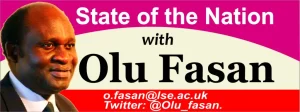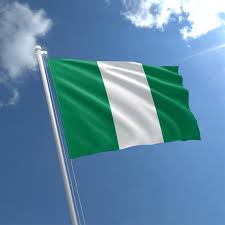
By Olu Fasan
NIGERIA is one of the very few countries where politics is the most attractive human endeavour, where holding a political office is more profitable than running a business. In Nigeria, politics is the quickest route to wealth, thanks to outrageous salaries and allowances – Nigeria’s federal legislators earn far more than their American counterparts – and corrupt self-enrichment.

In Nigeria, politics is largely a quest for private gain rather than public good. But nothing entrenches these perversities more than the lack of strong institutions and active citizenry. For not only do the system and the citizens allow wrong politicians to get to power, there’s virtually no institutional or societal pressure to hold elected politicians accountable.
In recent weeks, some prominent Nigerians have lamented this situation. First, Rotimi Amaechi, former governor of Rivers State and Transport Minister, balked at contributing to public discourse. “What’s new to say,” he said. “Nigerians don’t react to anything. Nothing bothers Nigerians, nothing.” In a TV interview, Bishop Matthew Kukah, the Catholic Bishop of Sokoto Diocese, said: “The political class will continue to behave the way they do largely because we let them do so,” adding: “Our duty and responsibility is to constantly make those who govern us feel uncomfortable if they are not performing well.” Lastly, Professor Pat Utomi, renowned political economist, argued that “the major problem of Nigeria is the docility of its citizens,” saying: “Nigerians are at home with anything thrown at them.”
A few centuries ago, the philosopher Joseph de Maistre famously said: “Every nation gets the government it deserves.” He meant that it’s up to the citizens of every nation not only to elect the right leaders but also to hold them accountable. Unfortunately, Nigerians don’t perform these sacred duties; they don’t act as a bulwark against bad leadership. Dr Segun Aganga says in his book Reclaiming the Jewel of Africa: “Our greatest weakness is the Nigerian citizen who needs to be reminded what it means to be a citizen all over again.”
But what do theories of social and political change tell us? In his book Why Change Happens, Professor Cass Sunstein, renowned American legal scholar, argues that social and political change occurs when people are willing to challenge a status quo and their resistance reaches a critical mass, a tipping point. What pushes citizens to that level of resistance?
Well, in a paper titled “Democracy, Development and Conflict”, Professors Paul Collier and Dominic Rohner, of Oxford University, posit that pressure for change is inevitable in countries where poverty and inequality are rife, and the quality of political and economic governance is poor. Then, in their book Why Nations Fail, Daron Acemoglu and James Robinson argue that without pressure from citizens, a government may not perform and serve the public good.
Truth is, Nigeria defies the above theories. Although Nigeria is ripe for radical social and political change, given the extreme levels of poverty and inequality and the abysmal levels of political and economic governance, there’s hardly any pressure for change. Even if there are pressures, the critical mass, the tipping point, necessary for the dam to burst, for change to happen, is never reached. Thus, change eludes Nigeria, which remains sclerotic!
In many countries, the first line of resistance against bad leaders and governments is strong and independent institutions, followed by robust and fiercely independent media. But, as Professor Collier rightly points out, some governments can’t tolerate strong institutions, such as independent legislature, judiciary, electoral body, central bank, anti-graft agency, etc., and don’t want probing media. Indeed, in Nigeria, the preference is for strong personalities rather than strong institutions. And while Nigeria’s media are largely free and vibrant, they are subject to outright hostility from government. For instance, recently, the NGO, Socio-Economic Rights and Accountability Project, SERAP, sued the president, Bola Tinubu, for banning 25 journalists from covering the Presidential Villa!
But if Nigeria’s institutions are weak and the media can’t operate as they should, where should pressure on government come from? Undoubtedly, from the citizens themselves, through non-violent resistance. Sadly, Nigerian government typically suppresses peaceful protests, a legitimate tool in a democracy, whereas civilised democracies allow them. Yet, even without statist suppression, societal pressures are rare in Nigeria. Why? I adduce four reasons.
Tribalism tops the list. Recently, a relative told me: “Please tone down your criticism of Tinubu in your column.” I asked why he never said that when I criticised President Buhari and his government for eight years. “It’s different,” he said, adding: “Tinubu is one of us.” Well, he’s a fellow Yoruba. Livid, I told him I abhorred any ethnic game. But most Nigerians play ethnic and religious games, which politicians selfishly exploit. Consequently, it’s hard for any pressure for change to reach a critical mass, a tipping point, in Nigeria.
- Source: https://www.vanguardngr.com/2023/11/active-citizenry-if-nigerians-dont-hold-their-leaders-accountable-who-will-by-olu-fasan/




GIPHY App Key not set. Please check settings